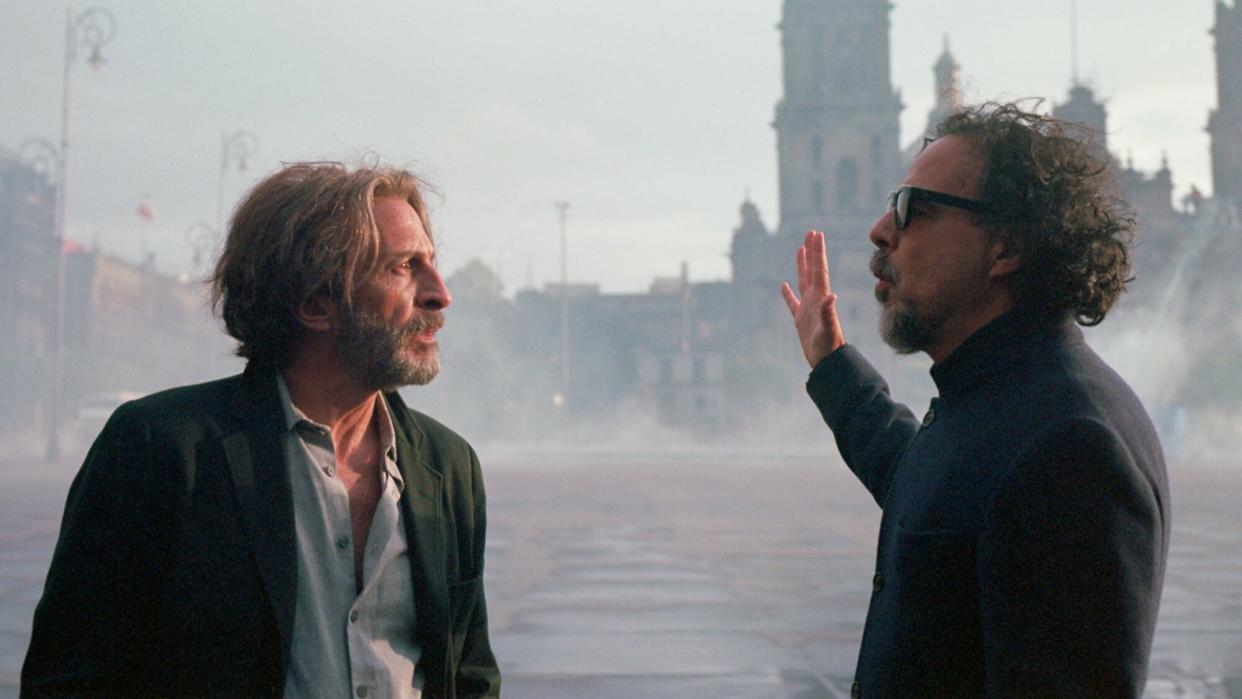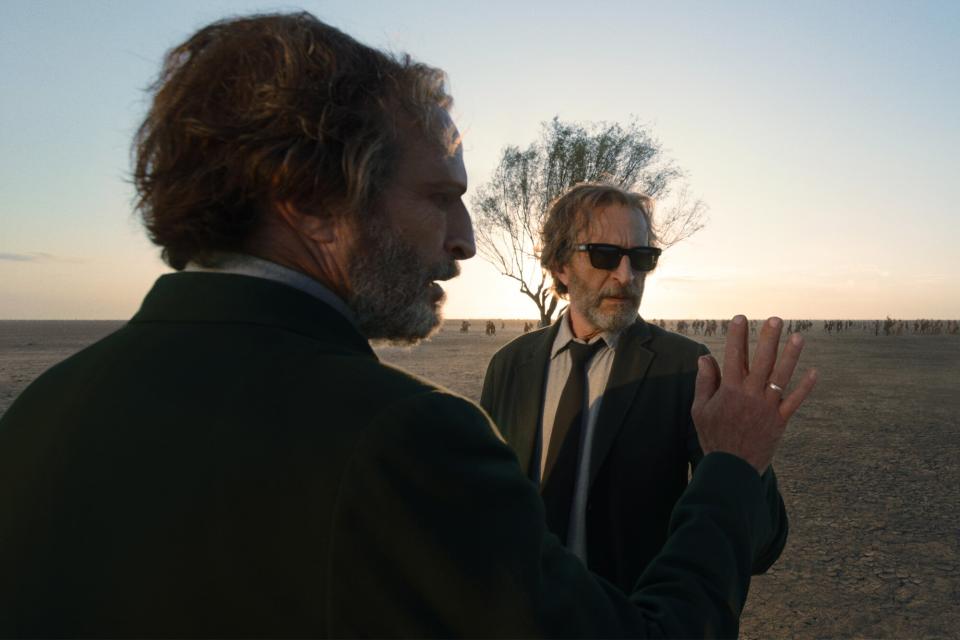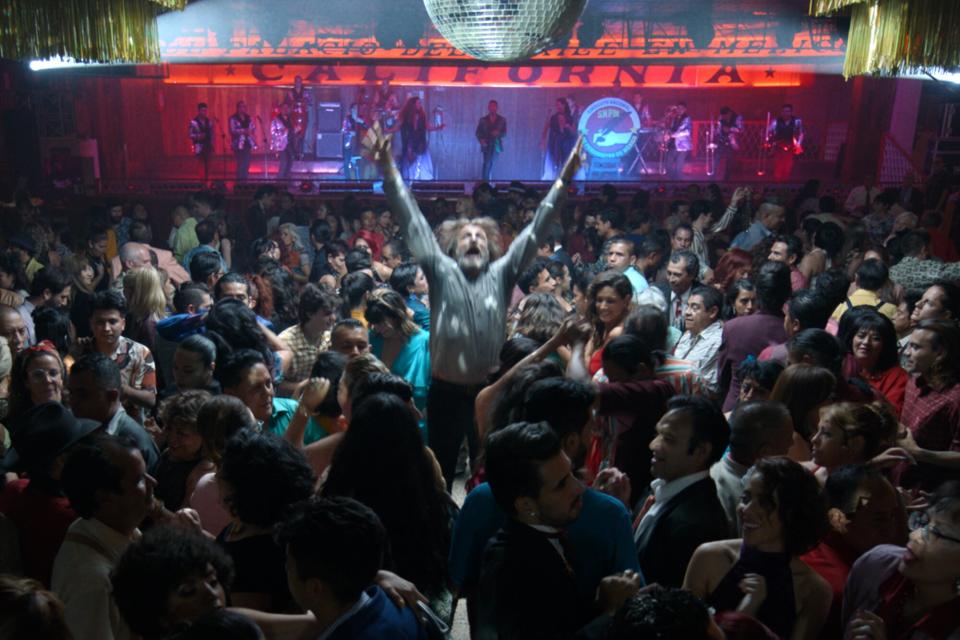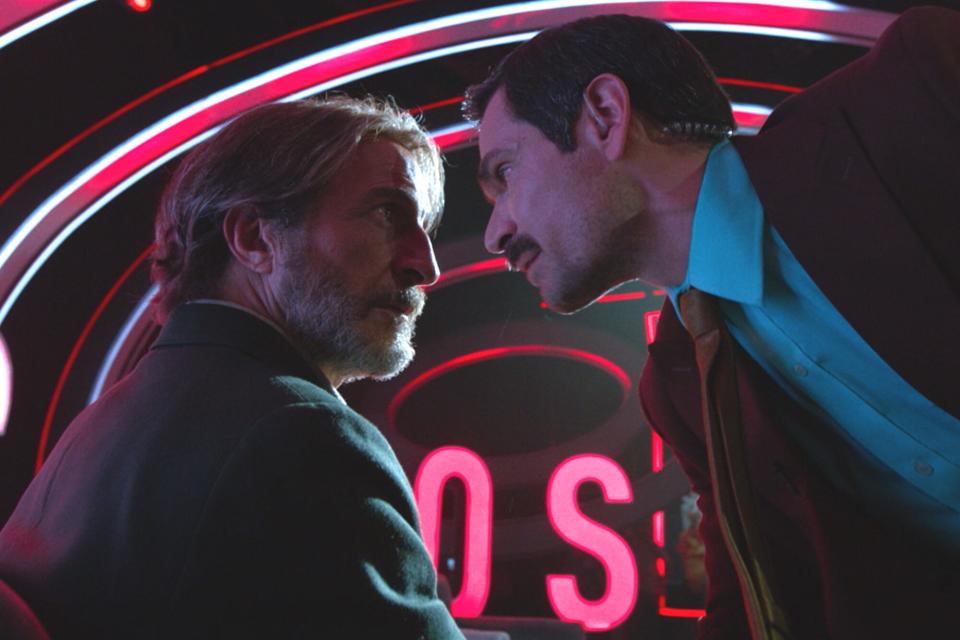Alejandro González Iñárritu explains why he cut 22 minutes from new film Bardo

- Oops!Something went wrong.Please try again later.
- Oops!Something went wrong.Please try again later.
What do you do after winning the Best Director Oscar two years in a row? Alejandro González Iñárritu took a couple of years to figure out his answer. After experimenting with virtual reality in 2017, the director of Birdman and The Revenant is back on screens with Bardo, False Chronicle of a Handful of Truths — a film that moves seamlessly between fiction and reality, between events taken from the director's own life and others from the history of Mexico.
When Bardo premiered at the Venice Film Festival earlier this year, it was three hours long. But the version of Bardo that hits movie theaters this weekend and lands on Netflix next month is about 22 minutes shorter. EW spoke with Iñárritu about that editing decision, what he thinks of critics, and how modern life has become a strange mix of reality and fiction in its own right. Check out an edited version of our conversation below.

Limbo Films, S. De R.L. de C.V. Courtesy of Netflix Alejandro González Iñárritu directing Daniel Giménez Cacho on 'Bardo.'
ENTERTAINMENT WEEKLY: You won Best Director at the Oscars two years in a row, not a common feat. How long after that did it take you to figure out what you wanted to do with your next film?
I think an important project that I did before Bardo was Carne y Arena (Flesh and Blood), which was a virtual-reality installation about immigration. I interviewed hundreds of immigrants that crossed the border in rough situations, and that installation was very dear and powerful for me, an experience that really got me close to the immigrants.
I have spoken about immigration in two other films, Babel and Biutiful, but this installation of virtual reality took me close to that, in a way that never has happened to me. So I think that experience really has a lot to do with this film. In a way, I felt that it was a necessary thing for me to now speak about it, but from my perspective and my own personal experience.
It sounds like seeing what those immigrants went through made you think about your own journey from Mexico to America, is that right?
Exactly, exactly. As I say in the film, I'm a "first-class immigrant." My experience is 0.00011 percent of what millions of people go through. But no matter how successful that experience is, we share that strange and graspable feeling of this location of broken identity, and the fact that you are not from there or not from here, and this is kind of the main point of the film.
That makes sense because while I was watching the film, I was wondering why you had Silverio be a documentarian as opposed to a director of films like yourself. But it sounds like that scene where we see a clip from one of his movies where he's interviewing these immigrants as they're walking was influenced by your experience with Carne y Arena.
Yeah, I think this film navigates between reality and fiction and imagination. I think the world we are living in now is navigating, unfortunately, between those two worlds. You don't know exactly what is real, what is fiction.
I think that a journalist has the access to, in a way, be looking for truth and at the same time, interpreting that truth from his own subjectivity. I think as a filmmaker, sometimes when you do a film, you do research, you get sources from the real world, and then you can use fiction to really get to a higher truth. So in a way, I thought that it was an interesting thing for me to allow this character to be navigating and questioning these two approaches of life and being uncertain of both.

Limbo Films, S. De R.L. de C.V. Courtesy of Netflix Daniel Giménez Cacho in 'Bardo, False Chronicle of a Handful of Truths.'
Lately, it feels like ever since Alfonso Cuarón made Roma, a lot of veteran filmmakers have started producing their own films like Roma, about their childhoods, their parents, the neighborhoods they grew up in. I found it refreshing that Bardo, by contrast, is rooted in the present day and current worries. Did you ever consider making one of those movies about your childhood? What made you want to engage with the present instead?
No, I barely remember my childhood. I envy people who can fundamentally rebuild their lives from that foundational time. I don't have that access, unfortunately. I probably think that only these last 25 years could possibly inform me of who I was and who I am, and that's why the fabric of this film is made of what I can guess. I remember elusively, and I do not claim truth, or this being any autobiography at all. I think autobiographies are a lie, and they are hypocrisies. I think that the only thing we can claim is, as the characters say, the emotional conviction of those memories. I build this by thoughts, reflections, fears, and dreams. That's why the fabric of this film is elusive, but it's emotionally truthful. That's the best way I can share where I am now — without any certainty, by the way.
Your name is everywhere in the credits of this film. In addition to directing, you wrote, produced, edited, and even worked on the score. What was the collaborative process like for such a personal film? What did your collaborators bring to it?
This film was a huge, major enterprise, and I was lucky to collaborate with some of the best people in the world: Darius Khondji, Eugenio Caballero, Nicolas Giacobone in the writing process, and Bryce Dessner with the music; Anna Terrazas. The level of collaborators that I had was amazing. Without them, it would be impossible. I needed them because the process was so long: It took me four years to make the script alone, and it was so personal that I needed to really get into, for example, the editing. The film demanded my participation in those areas but obviously, with the collaboration of the best people in the world and a great family.
Was this your first time working on the music of one of your films?
Yes.
What was that like, working with Bryce Dessner?
It was amazing because Bryce did the third act of The Revenant and we became very good friends. Then, along the way, during the writing process of this film, I was trying to get some of the tone. For me, it's important to get the music of the film before shooting: The rhythm of the film, the atmosphere, the tone. I was whistling some Mexican tunes from Oaxacan bands, which always have these beautiful metal sounds that are exquisitely out of tune. It's very particular and only as a Mexican can you know those sounds. So I just put down a bunch of ideas during two years of whistling things, and when I shared it with Bryce, he was very enthusiastic about it, so he included me in working with him. He's the genius, so for me, it was an honor and a privilege to participate with what I could.

Limbo Films, S. De R.L. de C.V. Courtesy of Netflix Daniel Gimenez Cacho in 'Bardo.'
Another collaboration I'm interested in is the one with your star, Daniel Giménez Cacho. You've obviously worked with a lot of great actors over the course of your career. What was it like working with Daniel and building the character of Silverio?
I sat down with him, and we had this dinner, and I realized that he's from the same generation. His circumstances are very similar to mine in his own life. He had gone to some therapy, and when he told me certain things based off that, I was super shocked: It sounded like he had already read the script! It was kind of a cosmic encounter. I knew that not only was he a great actor, but as a person, his energy was perfect to convey some of the things that I wanted.
He really took every event of this character, which is an alter ego, but he made it his own. All the relations he built from his experience, like the relationship with the two kids. He has two kids the same age as mine. So in a way, he made all the elements of the film live in his own skin, and he was basically going through his own personal process without thinking of me. He really embraced Silverio as a character, and he went through a very personal process during the film.
When Bardo premiered a couple of months ago at the Venice Film Festival, many of the write-ups focused on it being three hours long. But the version that's coming to theaters this weekend and Netflix next month is about 22 minutes shorter. What was that editing process like? What made you want to go back and edit it more?
I finished the film just two days before going to Venice, so I never had the chance to see it with an audience. The first time that I saw it with audiences was in Venice. So for me, it was very clear in that moment in front of two thousand people that I had opportunities, without affecting the essence of the film, to make the same film but thinner. I felt that I could make some scenes tighter and get to the point faster, without really sacrificing anything at all. For me, editing is an endless process that you can play with, especially with this film that is so open. I would have loved to have even more time, but I couldn't. You have to release the film because of a festival date or the scheduled release. Anyway, I was very happy that I was able to really just feel that and put another couple of weeks of work in. It was very clear and easy for me to get to this cut, which I'm very happy with.
Do you think you'll keep fiddling with the film?
Yes, if I could. A film never is finished — it's an endless process. It's like when you write an article, and you go through first drafts and second drafts, you always can take out one word or do things better.
Yeah, this happens to me. I think an article is finished, then once it's out in the world, I'm like, Oh, why did I leave that in?
Exactly. There's always a way to make it stronger. So again, it's an endless process, and I had the opportunity to do it.

Limbo Films, S. De R.L. de C.V. Courtesy of Netflix Silverio Gama (Daniel Giménez Cacho) confronts his harshest critic in 'Bardo.'
There's a character in this movie, an old friend of Silverio's, who rips into him at the party and criticizes all these things about his documentary, some of which we then later see in the film. It reminded me a bit of the critic character in Birdman. When you're writing or working on films, are you already wondering what the critical response might be and trying to incorporate it?
No, I think I can be harsher with myself than anybody else. I think we all have that co-pilot voice that can be navigating in either way to the good or to the bad, and that's a natural state of the mind. The mind is relentless in every human being, and I have been very conscious about it. So in a way, I can see exactly what it is going to say, how predictable the mind is, and how superficial and judgmental it is. It's like the sides of our brain: The left side is always rational and demands logic and chronology without acknowledging the other side, which is complete freedom and is not attached to any one idea.
I like to observe those two natures. Rather than any particular critic or reviewer, I'm thinking about how one side of our brain works and how the other works. I try to do this dialectic between the two of them, the two ways to see the world and how we can navigate through that battle. So the film is very dialectic in every sense. You are a father, you are a son. You go through death, life, success, failure, fiction, reality. I approach this film through dualities, and that is one of them.
How did you think about the more surreal elements? The film opens with the death of a baby, and we see it both from a magical perspective and reality.
I think this film is a walk in the consciousness of a character. It's a story without story. The fabric of the film is made of these very elusive things that form us. It's our rational mind trying to get everything into a rational world. But if we observe a little deeper, we are built of these memories, these fears, these events that then later become an elusive emotion or feeling that is floating not in a material, realistic way, but in the way we remember it emotionally. That emotional conviction is the one that I depart from. The film is built from emotional representations of events because the event is gone, but the way you remember it and then process it helps it grow and mature and assimilate. Then you can liberate yourself from it. As the character said, "People are gone, the ideas are what stays."
My wife and I lost a kid, and that took time to process, but then you can even have a sense of compassion or laugh about it — that's liberation. That's what I'm talking about: that things are not the things they are, it's the way you think about them that is important. That's how I did it, and that's what cinema exists for. As Godard said, "Life is a film badly made." In a way, when you make a film you're trying to make something that is better than life, in a way.
Another element of the film that straddles this line between reality and perception is the running idea that Amazon is buying the Mexican state of Baja, California. Even as the characters in the film are struggling with their national identity — are we Mexican? Are we American? — there's this shadow of multinational corporations that are becoming more powerful than national sovereignty. What were you thinking about there?
I think that's the world we are living in now. I don't think we are too far from that. I don't think we are too far from films being made by artificial intelligence with no human intervention. I already saw one six-minute film made by computers, and it was awesome.
So what I'm saying is, we are seeing things in the world now that nobody's talking about. Corporations do not only own the narrative of the world, but they have much more resources and money than countries. People will be happy about that, to belong to a corporation more than governments. There's a humor about that; there's an irony and a contradiction about that. When you read the news, the internet is a bardo between fiction and reality. There is no way you can say, "Oh, this is real or unreal." So Bardo is that. In a way, we are going to be living through a world that is as outrageous and crazy as that. Anyway, it was a point of humor that I want to include based on this kind of crazy dream.
Another scene that really stands out I think is that conversation with Cortés. How did you approach that scene and build that giant mountain of corpses that they're standing on?
It took me a lot of work. I think this film visually has been the most challenging film that I have done. It's an immersive, brutal, cinematic experience. That's why I want people to see it in the theaters. It opened last week in Mexico on 500 screens for seven weeks, so it's an unprecedented thing for Netflix, and it's in IMAX. You should see it in IMAX because scenes like that are so big and brutally visual.
I shot it in the plaza in the Zócalo, which is the heart of Mexico City. It's exactly where the pyramids were built by the Aztec Empire, and the cathedral is built from the stones of those pyramids that were destroyed. Ever since I was a kid, I was imagining the stories that I read from the conquest and how that kind of conquest happened, and what that empire looked like. I don't know if you have seen pictures of Teotihuacan, but it was the Venice of America. It was only water channels — it was beautiful.
When the Spanish arrived, their letters were like, "This is the biggest city we have ever seen, the most incredible hydraulic engineering," and now we are not there. I shot it in the same place that all these things happened and it was very interesting and beautiful for me to get at, emotionally, what I feel. And to build that, I had to storyboard everything because it was very precise. And then most of it is physical. Everything is very physical and then obviously with some visual effects. But the government allowed me to empty all of downtown for three hours, so I had the space to shoot that. And we had an amazing morning, full of Mexican dark clouds. It was a very lucky day to get exactly the mood that I needed. It was beautiful.
So in this film, you're engaging not just with your own emotions, but also with these old ghosts and the history of where you are.
Yeah, it was an exercise of trying to reconcile my personal intimate memories with the collective memories of a nation. We are all made of those kinds of big events and the most intimate events. We are part of our ancestors and our narratives in a collective way, but also in a personal way. It was kind of a Whac-A-Mole exercise to get the whole thing in there. This film is a state of mind, this film is an atmosphere.
Bardo, False Chronicle of a Handful of Truths is now in theaters, and will launch on Netflix Dec. 16.
Related content:

